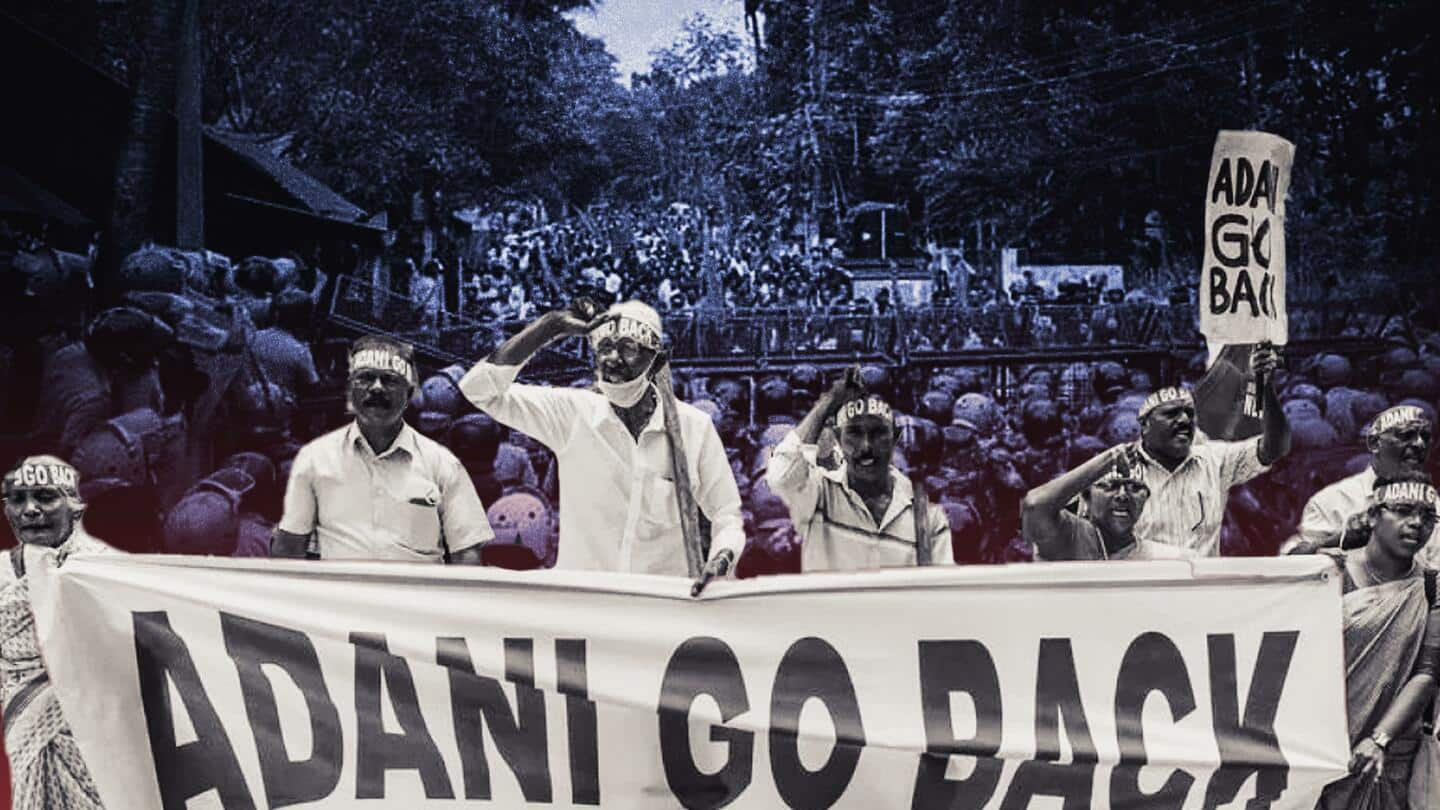
#NewsBytesExplainer: Why Keralites are protesting Adani's $900 million 'Vizhinjam port'?
What's the story
Adani Group's multi-billion-dollar plans to build the Vizhinjam International Transhipment Deepwater Multipurpose Port in Thiruvananthapuram, Kerala, is marred with controversies following the protests by fisherfolk.
The $900 million (Rs. 7,525 crore) project will be India's first transshipment port, potentially disrupting the present maritime trade by providing a flexible and cost-effective alternative.
Here's more on the issu and protesters' worries.
Context
Why does this story matter?
The port construction started in December 2015, and since then, fisherfolk have said that their catch size decreased dramatically—forcing them to venture further out into the sea.
After years of fruitless petitions, fisherfolk—most of whom are Christians—built shelters in protest in August 2022.
The port supporters, on the other hand, are primarily Hindus, which has the administration concerned that the protest would turn sectarian.
About
What is the Vizhinjam Port project?
Vizhinjam port would be an all-weather deep port with a 24-meter depth capable of accommodating giant-sized cargo ships, as per Mint.
The site of the port project is especially important because of the lack of coastal sedimentation, which means it does not require periodic dredging, lowering maintenance costs. The port, which is well-connected to the hinterland, was supposed to be built in stages.
Details
Significance of this project for India
Vizhinjam Port has been positioned as a prestigious project that will attract a significant share of the container transshipment business currently handled by Colombo, Singapore, or Dubai.
It may also help India's exports and imports as its located right off the International Shipping Lane and near the East-West Shipping Axis. It will also help to reduce total transportation costs and make manufacturing more competitive.
Controversy
How did the controversy begin?
The construction of the port, handled by Adani ports, ran into trouble when the local fishing community alleged that it was causing coastal erosion and destroying their livelihoods.
The villagers have alleged that they were even forced out of their houses due to coastal erosion.
Protesters alleged that unscientific construction of the artificial sea walls also increased coastal erosion--the allegation denied by Adani.
Official
Kerala government’s stand
The Union Government approved the project in 2014. It has been scrutinized ever since.
In 2015, the Kerala Congress administration led by Oomen Chandy signed a letter of intent with Adani Ports and Special Economic Zone Ltd. The Pinarayi Vijayan-led Left administration too supported the port expansion claiming it will bring international business and cash to the coastal state.
Reaction
CM Vijayan's statement days after the High court's intervention
The Kerala High Court ruled last month that protestors must allow construction on the project to continue.
Kerala Chief Minister Pinarayi Vijayan has also had multiple unsuccessful negotiations to overcome the impasse between the Adani group and the locals.
However, on Thursday, Vijayan stated unequivocally that the government will not abandon the project, which has been met with severe opposition from fisherfolk.
Demand
Demands of the fisherfolk
The major demand of protesters led by clergy is that the deepwater port construction should be stopped and an environmental impact analysis conducted.
They also urged that those who had lost their houses due to sea erosion be rehabilitated, and effective measures to reduce coastal erosion.
They also wanted financial assistance for fishermen during weather warnings and when they died in fishing accidents.
Protests
Adani bats for the intervention of central police
The project is jointly undertaken by the Kerala and Union governments and the Adani Group, which is bearing one-third of the cost. The conglomerate has filed a case against the state government alleging police inaction against protesters and demanded central police be brought in. Earlier last month, the ruling Communist Party of India-Marxist [CPI(M)] and their arch-rivals, the BJP, came together in support of the project.